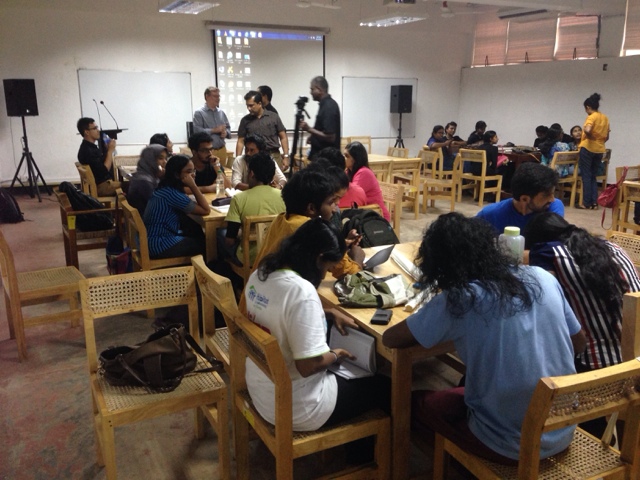Just a few days back into Colombo I thought we'd get a break from the intensity of Batticaloa. In a way we have, but we've picked up new intensities and uncovered new things to think about. My Fulbright theme of "landscapes in transition" is taking a focus on "human landscapes" these days, which makes sense. The first thing I teach my landscape students is that it's not a "landscape" without humans.
Last night we were asked out to dinner by our wonderful host Buwankeka Abeysuriya and his lovely wife. Not huge on going out to eat, this was my second evening out in a row but as Janet says, while in Colombo let's act like city people. We almost never go out at home in Boston and to get dinner and a glass of wine just about anywhere decent is $150. Literally last night we dined for pennies on the dollar. But no wine.
But I'm not writing about the cost or quality of going out in Colombo. Much more interesting was our ride home. On the Galle Road called "Main Road" here) almost simultaneously, and in a nearly perfect syncopated rhythm, our hosts started recalling the horrors of war. Terrorism, bus bombings, explosions, fear, and more or less how they lived through it.
Janet reminded me this morning after (I admit it) I complained about having to go out--what a big deal Bu made about how the restaurant we were at makes hoppers, how as we left he read and showed me each poster announcing each event around town. "A whole lot of nothing," I kvetched. And then she reminded me of when we first came here.
I'd invited my friend and colleague Janaka Wijesundara, his wife Jeeva, and our mutual colleague Koen deWandeler to our overpriced guest house for dinner--partly to inaugurate our time here and partly to plan for the student workshop run by Koen that was scheduled to run in conjunction with the International Conference on People, Places, and Cities. Over dinner Janaka mentioned that during the conflict people never went out at night. That was thirty years of sitting inside with your parents and grandparents.
Janaka and Jeeva went on to discuss how a whole generation of young people stayed inside. Didn't even know you could go out. Pretty amazing when you think (again) of our young peoples' paradise in Cambridge and Boston, where as we enjoy the $150 dinners "kids" roam the streets for miles from Union Square pretty much straight through to the Berkeley School of Music on Boylston Street. Imagine a world like that. And imagine what this world was.
So it's a new world here now and I guess even though the civil war ended six years ago it's never far from the surface. We had suspected this but just as in Batticaloa, it's a surprise to come in touch with the intensity of it.
Speaking of intensity...and my friend Janaka, yesterday I sat in on his review of student projects. They've spent four months on them and next week is hand-in. After that the final crit is November 28.
Not to embarrass Janaka any more than he was embarrassed I'll say that his students were "unprepared." They were a lot like my Boston University students who hand in execrable "capstone" projects they work on for weeks that totally lack critical analysis. I hate that experience. The massive waste of time as we "examine" group after group of poorly prepared students in their last glorious days before summer break, their combination of boredom and excitement. The way they "defend" their awful writing and their poorly thought out ideas by not answering our questions but jamming their "ideas" down our throats.
Janaka kept saying, "answer the question !" The same as we should insist when we probe for an explanation. "We aren't idiots," he insisted, as he looked at yet another set of woefully incomplete architectural "plans." We could and should say the same thing to our students though through our cultural lens they would take their complaint, as they've done many times before, to the dean or even the president of the university. "They insulted us," or "they didn't show respect," when we criticized papers that didn't deserve respect. Work that didn't merit a passing grade.
Yet everyone passes. And yesterday, despite his repeated question, "would you like to try again next year?" students insisted that they wanted to submit next week and defend on the 28th.
It was Janaka who was insulted. As I am each year during the vaunted capstone "process." Janaka is no slouch. In addition to holding a PhD he runs a busy architectural firm of his own that's produced projects from residential properties to major civil projects. I guess I'm no slouch either. And neither are my colleagues. But we repeat the process each grinding year. Reading capstones that are worse, meeting with groups that are less respectful, less engaged, and lately for me, very much against my judgement, meeting over dozens of hours with students who are not even mine.
But this is about my brave Colombo friends. Janaka looked at 36 "projects" yesterday. Most of the discourse was in Singhala though some was in English (all university instruction here is supposed to be in English). When he got particularly impatient with a student Janaka would point to me and insist, "English! He doesn't understand Singhala!" Actually the exercise for me was fun. At least getting to hear lots of Singhala connected to visuals, to get the rhythm of discourse, was instructive.
So. Two brave Colombo friends. Bu and Janaka. Both of them have built a life in spite of the hardships of war. Both put up with circumstances not entirely of their liking as they soldier forward. I'm lucky to get to know them as they work to shape the new Sri Lanka.




No comments:
Post a Comment